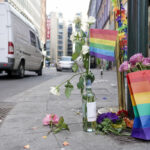An abortion decision long in the making
Few can imagine it today, but on the eve of the Roe v. Wade ruling in 1973, more Republicans than Democrats supported decriminalizing abortion.
That nugget comes from a fascinating work of historical, legal and political analysis published in The Yale Law Journal by Linda Greenhouse, a former Supreme Court correspondent for The New York Times and frequent contributing Opinion writer who now teaches at Yale Law School.
The paper, which Greenhouse wrote with Reva B. Siegel, a law professor and colleague in New Haven, drew upon and updated the second edition of their book on the same subject.
Greenhouse and Siegel tell the story of how G.O.P. strategists in the early 1970s decided that the party could attract new Republican voters by making a play to Catholics and evangelicals centered on abortion.
It took about 10 years for this new political coalition to coalesce along with the rise of Ronald Reagan, they write — powered by the emerging alliance between evangelical Christians and Catholics.
In one especially revealing passage, they point out how George Gallup, the pioneering pollster, noted in a column published in The Washington Post on Aug. 25, 1972 — nearly five months before the court published its ruling in the Roe case — that 64 percent of Americans, and 56 percent of Catholics, agreed with the statement “the decision to have an abortion should be made solely by a woman and her physician.”
At 68 percent, a greater proportion of Republicans agreed with that statement than did Democrats, at 59 percent, Gallup added.
Today, those figures look very different. According to Gallup Organization polling released early this month: 58 percent of Republicans supported overturning Roe, a record high, versus 15 percent of Democrats.
Blackmun, of course, was the primary author of the Roe decision, the fall of which on Friday set off political shock waves.
From Opinion: The End of Roe v. Wade
Commentary by Times Opinion writers and columnists on the Supreme Court’s decision to end the constitutional right to abortion.
Greenhouse said she didn’t know why Blackmun’s papers contained the poll.
“But what I assume it underscored for him at that time,” she said, “was that abortion was not a supercharged issue.”
“Every Republican president since Reagan has run on a platform of choosing those judges and justices who would vote to overturn Roe,” Greenhouse said.
We want to hear from you.
Tell us about your experience with this newsletter by answering this short survey.
Standing off outside the Supreme Court
On Politics regularly features work by Times photographers. Here’s what Shuran Huang told us about capturing the image above:
Abortion rights and anti-abortion protesters arrived this morning to wait for the Supreme Court’s decision on Roe v. Wade.
As the crowd grew bigger, both groups started to challenge each other. “My body, my choice,” the woman on the right yelled at the anti-abortion demonstrators.
About 15 minutes later, the decision came out.
Thanks for reading. We’ll see you on Monday.
— Blake
Were you forwarded this newsletter? Sign up here to get it delivered to your inbox.
Is there anything you think we’re missing? Anything you want to see more of? We’d love to hear from you. Email us at onpolitics@nytimes.com.





